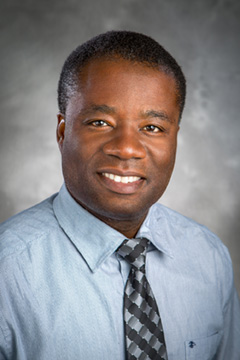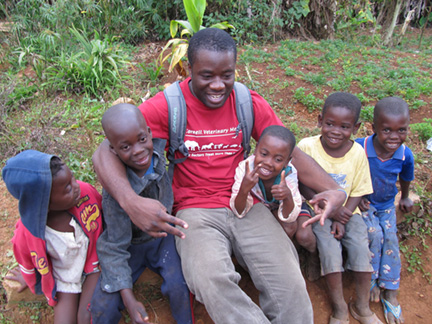Family Medicine
Riverside Mercury West Clinic
 Claude Louis grew up in Qui Croit, a small village in Haiti’s mountainous region. There was no infrastructure – no electricity or running water, no transportation, no local government. He never met his father, who died when Claude was just a month old: he grew up hearing stories about the man everyone in the village called “Doctor Leon.”
Claude Louis grew up in Qui Croit, a small village in Haiti’s mountainous region. There was no infrastructure – no electricity or running water, no transportation, no local government. He never met his father, who died when Claude was just a month old: he grew up hearing stories about the man everyone in the village called “Doctor Leon.”
“He wasn’t a doctor,” Dr. Louis says. “He only went to primary school, and then had some first aid training as a community health provider. But he was revered by the people in our village, and the more I heard about him, the more I wanted to be like him.”
Dr. Louis attended primary school in his village, but had to leave home to pursue his education. He went to the Baptist Haiti Mission in Fermathe, where he lived and studied until he enrolled in medical school at the Université Notre Dame d’Haïti.
There was never any question in Dr. Louis’ mind that he wanted to continue the work his father had started – he wanted to provide medical care to the people of Haiti. During his last year of medical school, he worked with a foreign medical team running mobile clinics in two different churches, seeing close to 200 patients a day. In 2005, with a generous gift of medications from friends in Canada, another medical student and a sports medicine physician, he established three mobile clinics in the mountains, caring for more than 100 patients each day – many of whom had never seen a physician.
That’s not unusual. “The need in Haiti is so great,” Dr. Louis says. “In many areas, there’s only one physician for more than 50,000 people.” In 2008, he established Words in Action Haiti, a nonprofit organization, to fund his continuing efforts.
In 2010, three years after graduating from medical school, Dr. Louis realized his goal of establishing a medical clinic in his father’s village. With a major donation from a Canadian philanthropist, Dr. Louis set up a clinic in a renovated building in Qui Croit – the only physician for miles around. In 2012, he came to the U.S. to pursue his residency in family medicine, but he was determined to keep the clinic open and to return to Haiti frequently. He recruited a capable Haitian nurse to see patients, and help them get to the Baptist Mission Hospital when advanced care was needed.
 Today, the clinic continues, staffed by a team of nurses, and Dr. Louis visits several times a year with other volunteer medical professionals. What started in a church building is now a newly built stand-alone medical clinic, featuring three consultation rooms, a pharmacy, a room dedicated to a lab, and two rooms for patient admission. Many of these patients have walked five miles or more to receive care. They come with hypertension, infections, GI issues, severe dehydration, pediatric malnutrition, asthma, labor complications – every symptom imaginable among people who have lacked medical attention.
Today, the clinic continues, staffed by a team of nurses, and Dr. Louis visits several times a year with other volunteer medical professionals. What started in a church building is now a newly built stand-alone medical clinic, featuring three consultation rooms, a pharmacy, a room dedicated to a lab, and two rooms for patient admission. Many of these patients have walked five miles or more to receive care. They come with hypertension, infections, GI issues, severe dehydration, pediatric malnutrition, asthma, labor complications – every symptom imaginable among people who have lacked medical attention.
These diseases and ailments Dr. Louis and his team can handle. More difficult to treat are the superstitions that often accompany patients: “Many Haitians have a fatalistic perspective on illness,” he explains. “They often attribute disease and poor health to being cursed by voodoo.” Thus educating his patients is among the most challenging components of care at the Qui Croit clinic. He’s proud that WIA is helping children at Qui Croit achieve their potential through its school sponsorship program, and is planning programs in agriculture training, water sanitation, nutrition, infrastructure and eventually local micro-finance for more sustainable community development in the future.
His goal is to train more people, so that “if something happens to me, the clinic will survive.”

